Target Malaria’s young scientists share their personal stories on how they are drawing the line against malaria


Science is all about understanding nature and applying the knowledge obtained through research to improving people’s lives. Every time a young person decides to start a career in scientific research marks a step forward towards making important discoveries which could improve the lives of many for generations to come. Think about great scientists such as Louis Pasteur, Alexander Fleming, or more recently Jennifer Doudna and Emmanuelle Charpentier – who were awarded the Nobel prize in chemistry for their work on CRISPR-Cas9 gene editing tools – and imagine how the world would be today without their work! These scientists were driven by their own passions and personal stories.
Scientists at Target Malaria also have their own reasons for venturing into the field of scientific research for malaria control. Target Malaria teams are based in 11 research institutions in Burkina Faso, Cabo Verde, Ghana, Italy, Mali, Uganda, the UK and the US. Their research spans across the fields of entomology, molecular biology, anthropology, mathematical modelling, and genetics, to mention just a few. Target Malaria researchers are a diverse group, and while they have a variety of different backgrounds, personalities, and cultures, they are united in their passion to defeat malaria.
On the occasion of World Malaria Day/Week and in keeping with the Draw The Line against malaria campaign’s focus on youth, I would like to share my story and those of my colleagues from the many different countries where we operate.
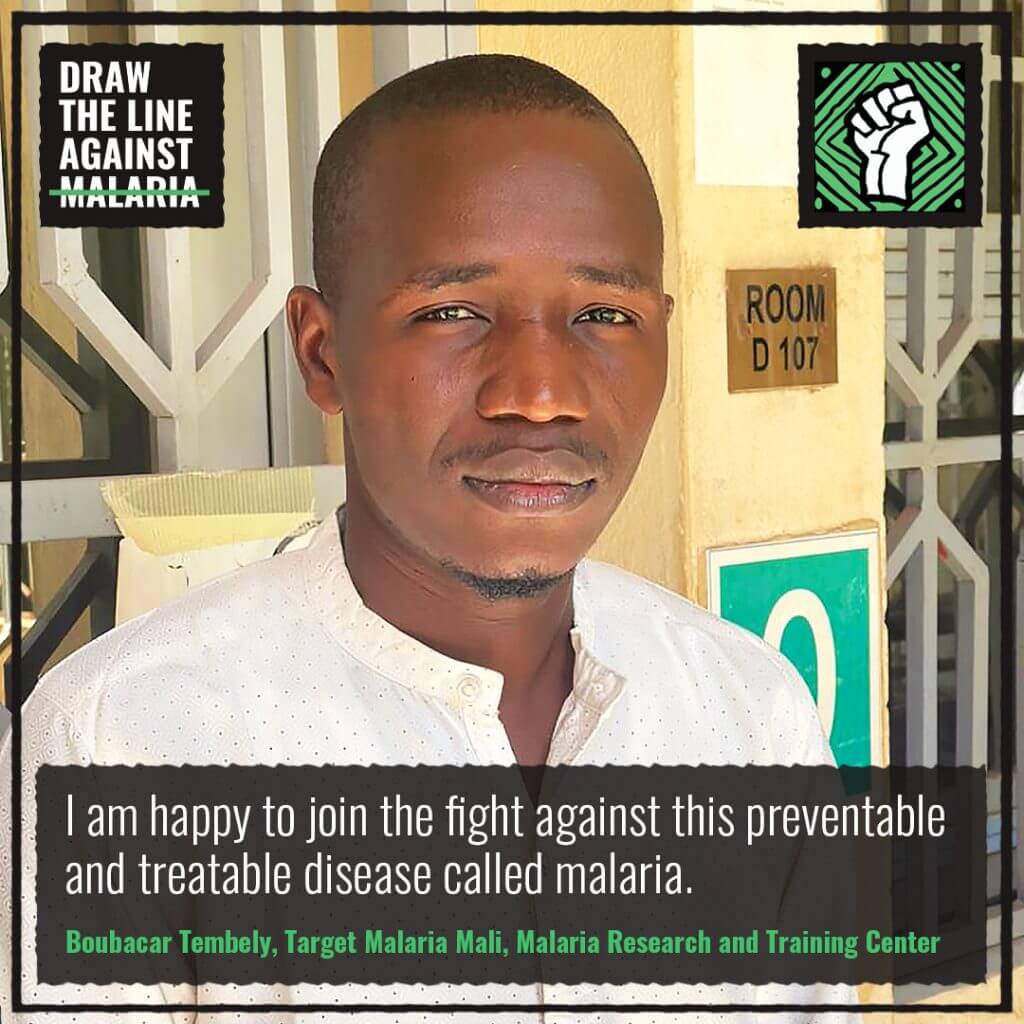
Boubacar Tembely, Target Malaria Mali
Malaria is a reality for every Malian. To protect our family against malaria, my father gave us a small anti-malaria tablet. This bitter little pill haunted me for my entire childhood. When it came to choosing a career path, the idea of helping to eradicate malaria was obvious.
I joined the Malaria Research Training Center at the University of Bamako. Target Malaria is an opportunity for me to join the fight against this preventable and treatable disease.
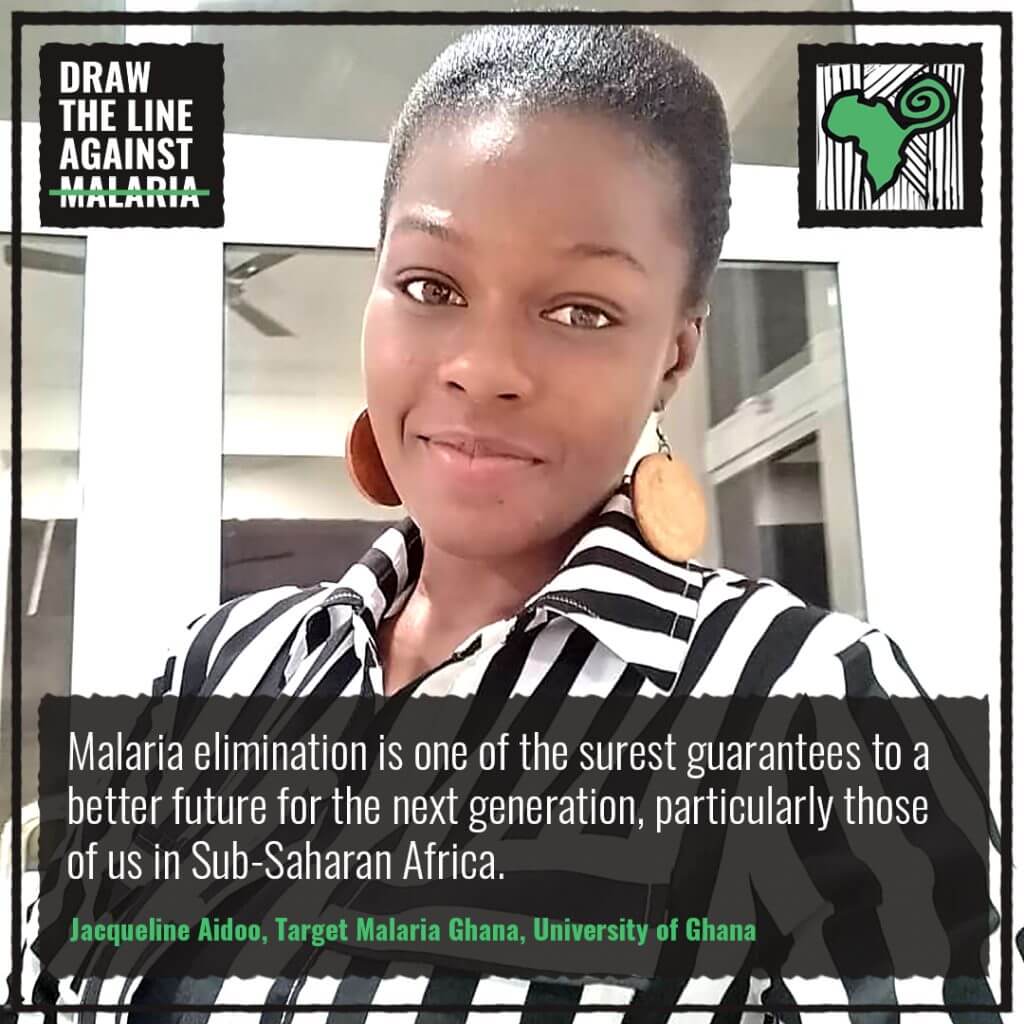
Jacqueline Aidoo, Target Malaria Ghana
Growing up in an endemic region, encountering malaria first-hand and seeing the impact of this deadly disease on young children and other vulnerable people in society was, and still is, distressing. These experiences greatly influenced my choice of study at undergraduate, postgraduate and, doctorate level and inspired me to obtain a holistic knowledge of vector-parasite interactions and of malaria. I believe my studies will sharpen my skills and help me to achieve my goal of giving a meaningful contribution to the control of vector borne diseases.
I am currently privileged to be part of the Target Malaria project, studying the “effect of fluctuating temperatures and humidity on the larval development and mating success of Anopheles gambiae adult male mosquitoes”. I hope the findings from my studies will contribute greatly to scientific research on malaria vector control and will help in optimising protocols for mass production of male mosquitoes that have a high competitive advantage over wild species when released in the wild. This work is particularly useful for vector control programmes whose success depends on the implementation of releases of male mosquitoes, such as those based on gene drive approaches.
The fact that our generation is closer to malaria elimination than previously, due to the increasing potential for the development of novel vector control options, is great motivation for me to keep striving to contribute my quota to a malaria free world; the best world yet.
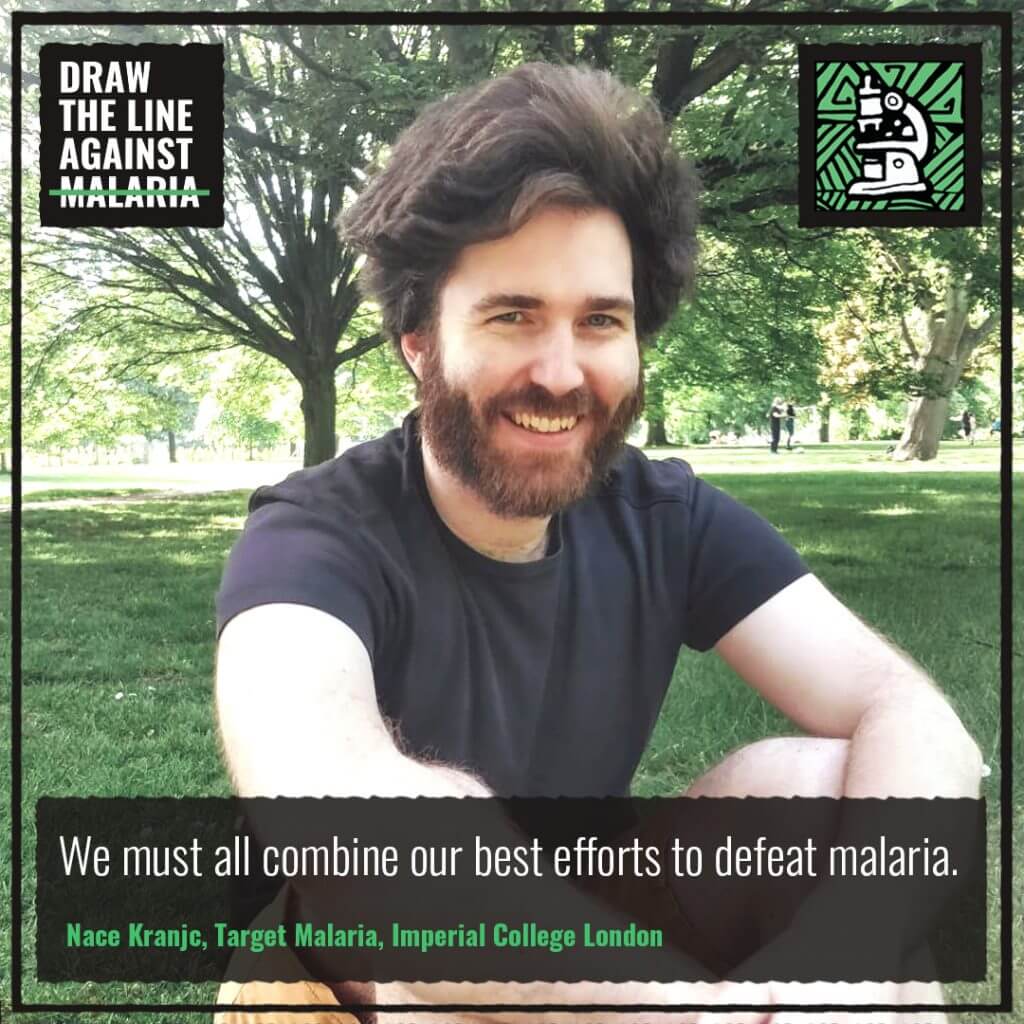
Nace Kranjc, Target Malaria UK
My name is Nace, I’m a PhD student in the Crisanti lab at Imperial College in London. I’m a computational biologist from Slovenia and I’m drawing the line against malaria by analysing the Anopheles gambiae genome to find suitable target sites for gene drive applications.
We must all combine our best efforts to defeat malaria. In this lies a big challenge and responsibility but also a great opportunity for so many pleasant and fruitful scientific collaborations.
I’m grateful and happy to be a part of such a diverse and inspiring project like Target Malaria.
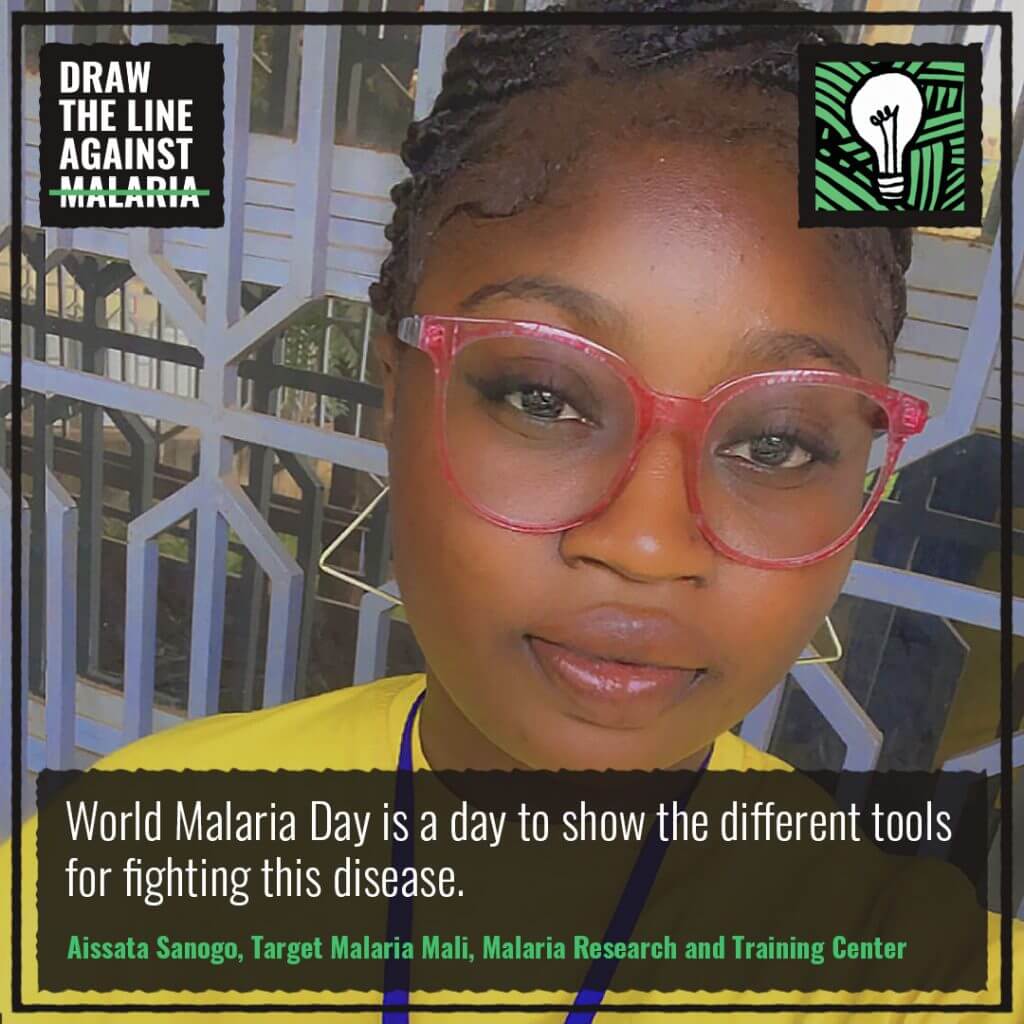
Aïssata Sanogo, Target Malaria Mali
My mother contracted malaria a few years ago. It all started one night when she complained of headaches. She was throwing up, had a fever, and was sweating profusely. A few hours later, her condition worsened, and she had to be rushed to a hospital. The doctor told us after some tests that she had malaria. I was scared and worried about losing my mother and this night still haunts me today. I never want to think again about the possibility of losing her to a preventable disease.
I joined the Target Malaria team with the aim of contributing to the evolution of vector control in order to eradicate this disease worldwide.
World Malaria Day is important in Mali because it is a day in which we remember to continue investing in the prevention of malaria. It is also a day to raise awareness of the seriousness of malaria in Mali and to showcase the different tools available to fight this disease.
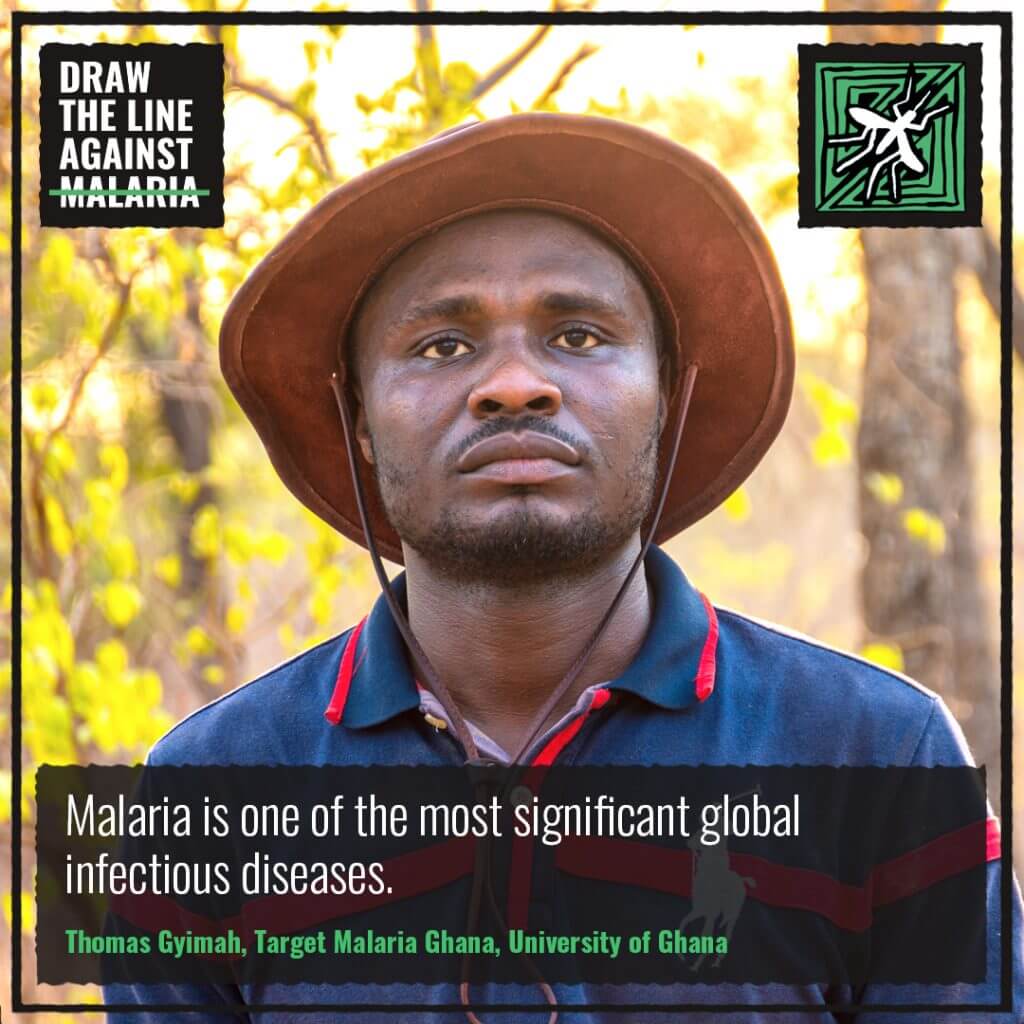
Thomas Gyimah, Target Malaria Ghana
Malaria is one of the most significant global infectious diseases. It was estimated to affect over 200 million people leading to 405,000 deaths in 2018. Because mosquitoes in the genus Anopheles are the sole vectors of the human malaria pathogen, novel strategies to control malaria, such as the one Target Malaria is working on, are focused on reducing this vector’s population size. In my work, I seek to assess the possible ecological implications of suppressing the population of An. gambiae on pollination. The objective is to determine whether suppressing the An. Gambiae complex would affect the surrounding ecosystem.
Pollination is an important ecosystem service that is necessary for the reproduction of over 90% of the 250,000 species of modern vascular plants. The diversity of animal pollinators and plants are dependent on each other, hence a reduction and/or loss of either could affect the survival of both.
Though the Anopheles gambiae complex is not a known pollinator of any plant species, they do visit flowers to feed on nectar, and thus have the potential to pollinate flowers. As a precautionary measure, it is important to assess the impact of Anopheles gambiae complex on pollination and seed sets, and to understand their role in the pollinator community network. My research is aimed at identifying the potential ecological consequences of new and existing methods for the control of the malaria vector, especially as current interventions typically rely on insecticide and insecticide-treated bed nets that are less species-specific and therefore affect a broader range of species.
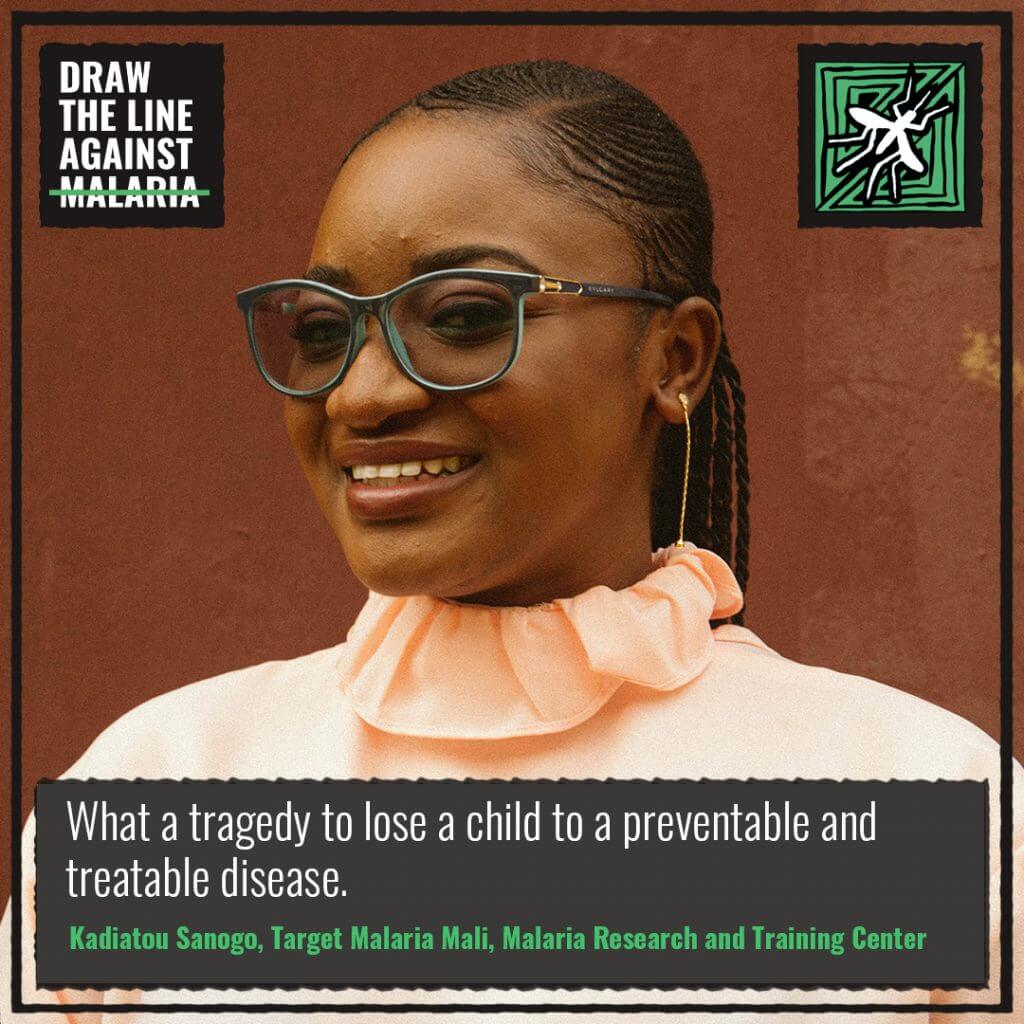
Kadiatou Sanogo, Target Malaria Mali
Four years ago I lost my little goddaughter Bintou Traoré, my friend’s daughter, to malaria. The doctors talked about neuro-malaria. It was awful for my friend and his wife. The helplessness mingled with the pain was unbearable. What a tragedy to lose a child to a preventable and treatable disease! When I had the opportunity to get involved in helping to eradicate this disease I saw the opportunity to save all the Bintous in Africa.

Adéritow Gonçalves, Target Malaria Cabo Verde
My name is Aderitow Goncalves, and since I was introduced to it, medical and molecular entomology has been my passion. As I finished my graduation studies, I moved to the laboratory of medical entomology at the National Institute of Public Health (NIPH) in the Cape Verde archipelago.
Malaria remains a huge problem in Africa, especially among children. For me, fighting the disease is a mission. In 2009, before I started my studies, Cape Verde faced a dengue epidemic. Although this was not a big problem on my local island, my community carried out a vector control campaign through breeding sites management. After starting my studies in 2010, I met a research group working on tropical diseases at my university, which I was part of during 5 years prior to moving to the NIPH. In the past 8 years I have been studying tropical diseases such as malaria.
Despite massive efforts to eradicate malaria, progress in the fight against this disease has stalled since 2014 according to the World Malaria Report 2020. Some countries have achieved malaria elimination and Cabo Verde aspires to become a malaria-free country, but we have a challenge. I don’t believe we can always compare countries that have achieved malaria elimination to those where malaria persists. The vectors’ density and distribution vary across different countries and so do local cultures and perception of the disease. If we are to fight back against malaria, we need new tools. Through Target Malaria I found a team well motivated to work towards a new approach. Gene drive isn’t a silver bullet and when available, after years of research, this technology will be complementary to current vector control tools.
In Cape Verde, malaria has been recorded in the archipelago since the 16th century. The number of autochthonous malaria cases in Cape Verde vary considerably from year-to-year and island-to-island. The archipelago interrupted local transmission twice (1967 to 1972 and 1983 to 1985), but malaria has a tendency to re-emerge. We are currently preparing to receive certification as a malaria-free country. The fight against this deadly disease can be different today thanks to a better public health system. To maintain this status, attention is needed. We must keep working on vector surveillance, on local communities and always remember to stay alert and close to policymakers.
Over the years, malaria has robbed our world of several future leaders. As young scientists, we all are joining hands to take back our future. We refuse to let the statistics continue to rise indefinitely. May it be said of us tomorrow that through our efforts, malaria is now a thing of the past.
